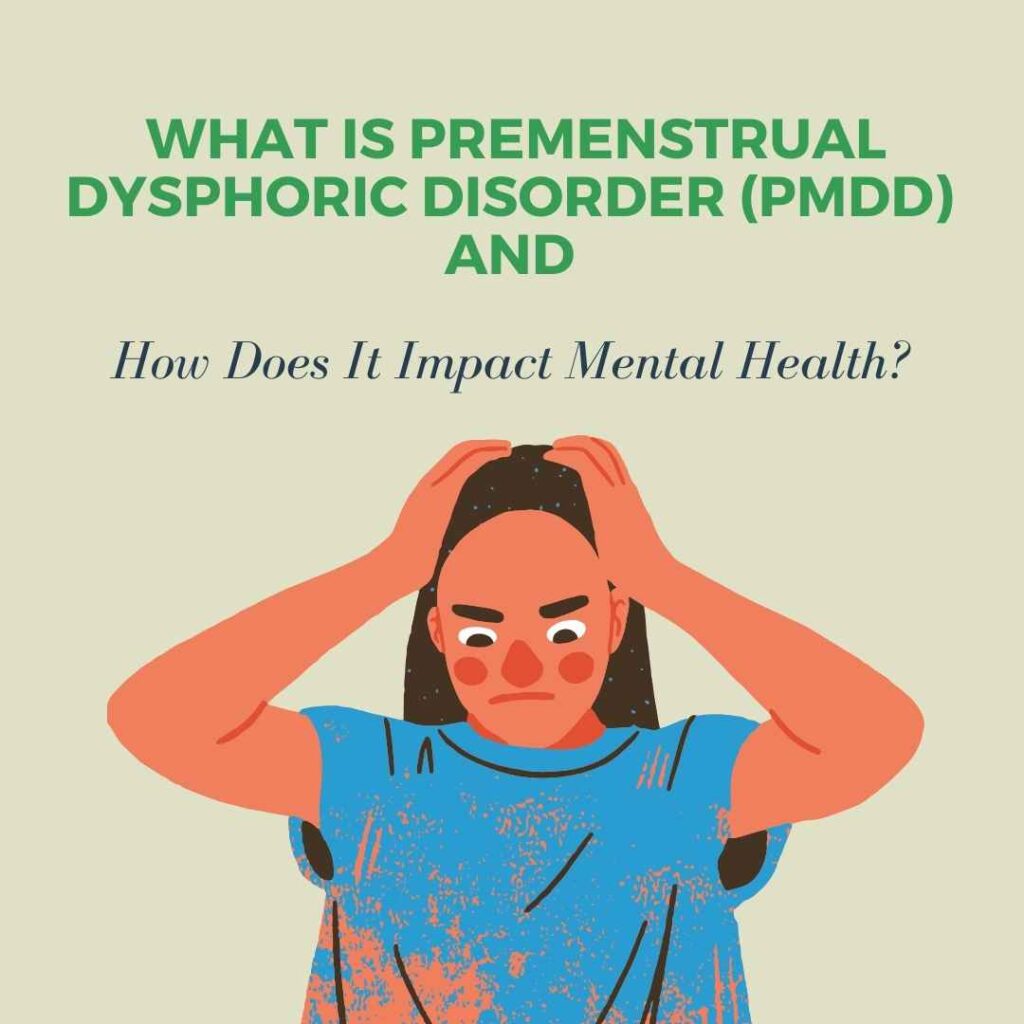Understanding Premenstrual Dysphoric Disorder (PMDD) and Its Mental Health Implications
Premenstrual Dysphoric Disorder (PMDD) is a complex and often debilitating condition that affects a significant number of women, primarily during their reproductive years. While many women experience premenstrual syndrome (PMS), characterized by a variety of physical and emotional symptoms, PMDD takes this experience to a much more severe level. Understanding PMDD is crucial not only for those who suffer from it but also for their families, friends, and healthcare providers. This blog aims to educate readers about PMDD, its symptoms, causes, diagnosis, treatment options, and the important mental health implications associated with it.
What is PMDD?
PMDD, or premenstrual dysphoric disorder, is a severe variant of premenstrual syndrome (PMS) that impacts approximately 3-8% of women in their reproductive years. Unlike premenstrual syndrome, which can cause mild to moderate discomfort, PMDD presents with a range of severe emotional and physical symptoms that significantly interfere with a woman’s daily life and relationships. Symptoms typically arise in the luteal phase of the menstrual cycle (the week before menstruation) and subside a few days after menstruation begins.
The symptoms of PMDD can be categorized into three primary areas: mood-related, behavioral, and physical symptoms.
Mood-Related Symptoms
Severe Depression: Feelings of extreme sadness, hopelessness, or worthlessness are common in PMDD and can be overwhelming.
Intense Anxiety: Heightened anxiety or panic attacks may occur, making daily activities feel insurmountable.
Mood Swings: Rapid shifts in mood can lead to irritability or anger, affecting personal relationships and workplace dynamics.
Increased Sensitivity: Heightened emotional sensitivity to interpersonal relationships and perceived rejections is a hallmark of this disorder.
Crying Spells: Frequent and uncontrollable crying episodes can occur, contributing to feelings of frustration and despair.
Behavioral Symptoms
Loss of Interest: A significant decrease in interest in daily activities, including work and hobbies, can affect quality of life.
Difficulty Concentrating: Problems with focus and cognitive tasks make it challenging to perform at work or manage responsibilities.
Fatigue: Severe tiredness that does not improve with rest is a common complaint.
Changes in Appetite: Eating too much or craving certain foods can cause weight changes.
Sleep Disturbances: Insomnia or excessive sleeping can disrupt daily routines.
Physical Symptoms
Breast Tenderness: Swelling and pain in the breasts can cause significant discomfort.
Joint or Muscle Pain: Unexplained aches and pains throughout the body can contribute to a sense of malaise.
Bloating: Abdominal discomfort and weight gain due to fluid retention are often reported.
Headaches: Increased frequency and severity of headaches are common during this period.
The severity of PMDD symptoms makes it extremely difficult for women to function at work, maintain relationships, and handle daily responsibilities. In some cases, PMDD can even lead to hospitalization due to the risk of self-harm or suicidal ideation.
Causes of PMDD
The precise cause of PMDD is still being studied, but several factors are thought to contribute to its development:
Hormonal Fluctuations: The menstrual cycle includes major fluctuations in hormones, especially estrogen and progesterone. Women with premenstrual dysphoric disorder (PMDD) may have an increased sensitivity to hormonal changes throughout their menstrual cycle, resulting in more severe emotional and physical symptoms compared to those without the disorder.
Serotonin Dysfunction: Women with PMDD may experience changes in serotonin levels, a neurotransmitter that helps regulate mood.
Genetic Factors: A family history of mood disorders can increase the risk of developing PMDD.
Psychosocial Factors: Stressful life events and overall mental health can contribute to the severity of symptoms.
Diagnosis of PMDD
Diagnosing PMDD involves a detailed evaluation by a healthcare provider, who will consider the following criteria:
The presence of five or more PMDD symptoms during most menstrual cycles over the course of a year.
Symptoms should lead to considerable distress or difficulties in social, work, or other vital aspects of life.
The symptoms should not be more accurately explained by another mental health disorder.
To assist in diagnosis, healthcare professionals may recommend maintaining a symptom diary to track the timing and severity of symptoms during the menstrual cycle, which can help in recognizing a clear pattern.
Treatment Options for PMDD
Managing PMDD often requires a comprehensive approach tailored to the individual. Treatment options may include:
Lifestyle Changes
Regular Exercise: Engaging in physical activity can help reduce symptoms by boosting mood and alleviating stress. Exercise is a powerful tool for combating PMDD symptoms.
Dietary Modifications: A balanced diet rich in whole foods while reducing sugar and caffeine can improve overall well-being. Eating complex carbohydrates and omega-3 fatty acids may also help.
Stress Management: Mindfulness techniques, such as yoga and meditation, can be beneficial in managing anxiety and enhancing mood.
Medications
Selective Serotonin Reuptake Inhibitors (SSRIs): These medications are often considered a first-line approach and have been effective in managing the emotional symptoms of PMDD. However, they should only be taken under the supervision of a healthcare provider.
Hormonal Treatments: Hormonal therapies, such as birth control pills, can help balance hormonal fluctuations, but they should be used only with a doctor’s advice. Other hormonal treatments may be considered in more severe cases, but it’s essential to consult a healthcare professional before starting any medication.
Psychotherapy
Cognitive-Behavioral Therapy (CBT): This form of therapy is effective in addressing negative thought patterns and teaching coping strategies related to PMDD. Therapy can also provide emotional support and validation.
Mental Health Implications of PMDD
The mental health implications of PMDD are profound and multifaceted. Women with untreated PMDD can experience significant emotional distress, leading to:
Increased Risk of Depression: The cyclical nature of PMDD can exacerbate underlying mood disorders, potentially leading to chronic depression if not addressed. Women with a history of depression may find that PMDD exacerbates their symptoms.
Suicidal Thoughts: Severe emotional distress associated with PMDD has been linked to suicidal ideation in some women. Healthcare providers must monitor symptoms closely and provide appropriate interventions.
Impact on Relationships: Mood swings and irritability can strain personal relationships, leading to feelings of isolation and exacerbating mental health issues. Open communication with partners and family members can help foster understanding and support.
Deterioration in Work Performance: The inability to function effectively at work or home due to debilitating symptoms can decrease productivity and overall life satisfaction.
Final Words
Understanding premenstrual dysphoric disorder is essential for recognizing its impact on women’s mental health. PMDD is not just a severe form of premenstrual syndrome; it is a significant mental health condition that requires attention and proper management. With appropriate diagnosis and treatment, many women can find relief from their symptoms, leading to an improved quality of life. If you or someone you know is experiencing severe premenstrual symptoms that interfere with daily living, it is vital to seek professional help. Early intervention can lead to effective management strategies that enhance well-being and restore balance during the menstrual cycle.
By raising awareness about PMDD and its implications, we can better support those affected by this challenging condition and promote mental health advocacy for women’s health issues. By addressing the symptoms and treatment options for PMDD, we hope to empower women to seek the help they need and deserve.
Facing any period-related issues? Reach out to Mrs.K.Reshma for personalized diet plans and expert yoga training tailored just for you!
Disclaimer: This information is for educational purposes only. Do not self-treat or follow any treatment recommendations without consulting a healthcare professional first. Your health is important, and professional guidance is crucial for proper management.


